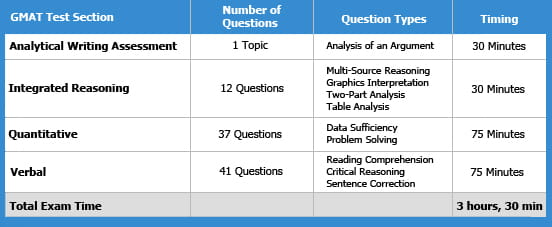Many potential MBA students may look at MBA rankings, although this may not always be the best criteria for choosing the right MBA program. Several organizations publish a yearly MBA program rankings table; some of these MBA rankings provide information on MBA job prospects, MBA career services of the Business School and MBA salary information for graduates.
Key criteria for choosing any postgraduate degree should be the accreditation of the MBA or Master program.
The traditional MBA program is the General MBA. Several Business Schools offer specialized MBA programs or MBA programs with emphasis, on a particular subject such as MBA marketing, finance, accounting, leadership, entrepreneurship, international business, sustainability, insurance, logistic, project management or MBA courses for a specific industry sector, such as a Master of Business Information in aerospace, oil and gas or agriculture. MBA programs can vary significantly in quality and tuition fee structure.
Test Structure & Overview
The GMAT exam consists of four main sections—Analytical Writing Assessment, Integrated Reasoning, Quantitative, and Verbal.
Here is a snapshot of the GMAT exam format and timing.

You have three and a half hours in which to take the exam, but plan for a total time of approximately four hours if you choose to take the optional breaks.
The Quantitive and Verbal sections of the GMAT exam follow a computer adaptive format.
How does it work?
- The GMAT adjusts to your individual ability level, which both shortens the time it takes to complete the exam and establishes a higher level of accuracy than a fixed test.
- At the start of each multiple-choice section of the exam, you are presented with a question of medium difficulty. As you answer each question, the computer scores your answer and uses it—as well as your responses to any preceding questions—to determine which question to present next. Correct responses typically prompt questions of increased difficulty. Incorrect responses generally result in questions of lesser difficulty.
- This process will continue until you complete the section, at which point the computer will have an accurate assessment of your ability level in that subject area.
-
In a computer-adaptive test, only one question at a time is presented. Because the computer scores each question before selecting the next one, you may not skip, return to, or change your responses to previous questions.
What if I make a mistake or guess?
- If you answer a question incorrectly by mistake or correctly by randomly guessing, your answers to subsequent questions will lead you back to questions that are at the appropriate level of difficulty for you.
- Random guessing can significantly lower your scores. So, if you do not know the answer to a question, you should try to eliminate as many answer choices as possible and then select the answer you think is best. For more testing strategies.
What if I do not finish?
- Pacing is critical, as there is a severe penalty for not completing these sections of the exam.
- The time and number of questions that remain in the section are displayed on the screen during the exam.
- There are 37 Quantitative questions and 41 Verbal questions. If a question is too time-consuming or if you don’t know the answer, make an educated guess by first eliminating the answers you know to be wrong.
How is my score determined?
- The number of questions you answer.
- Whether you answer the questions correctly or incorrectly.
- The level of difficulty and other statistical characteristics of each question.
- The questions in an adaptive test are weighted according to their difficulty and other statistical properties, not according to their position in the test.
Are all questions counted?
- Every test contains trial multiple-choice questions being pretested for use in a real exam. These questions are not identified and appear in different locations within the test.
- Do your best on all questions. Answers to trial questions are not counted in the scoring of your test.
What computer skills do I need for the GMAT exam?
- You need only minimal computer skills to complete the GMAT exam. Familiarize yourself with the mechanics of taking a computer-adaptive test by using the GMAT tutorials that are included with the freeGMATPrep® software.
- The tutorials cover such topics as using a mouse, entering responses, moving on to the next question, using the word processor, and accessing the Help function.
- Before the day of your test, review the testing tools covered in the tutorials. Although you will be able to use a Help function during the test, the time spent doing so will count against the time allotted for completing a test section.
|
